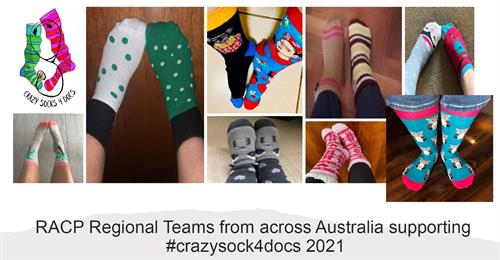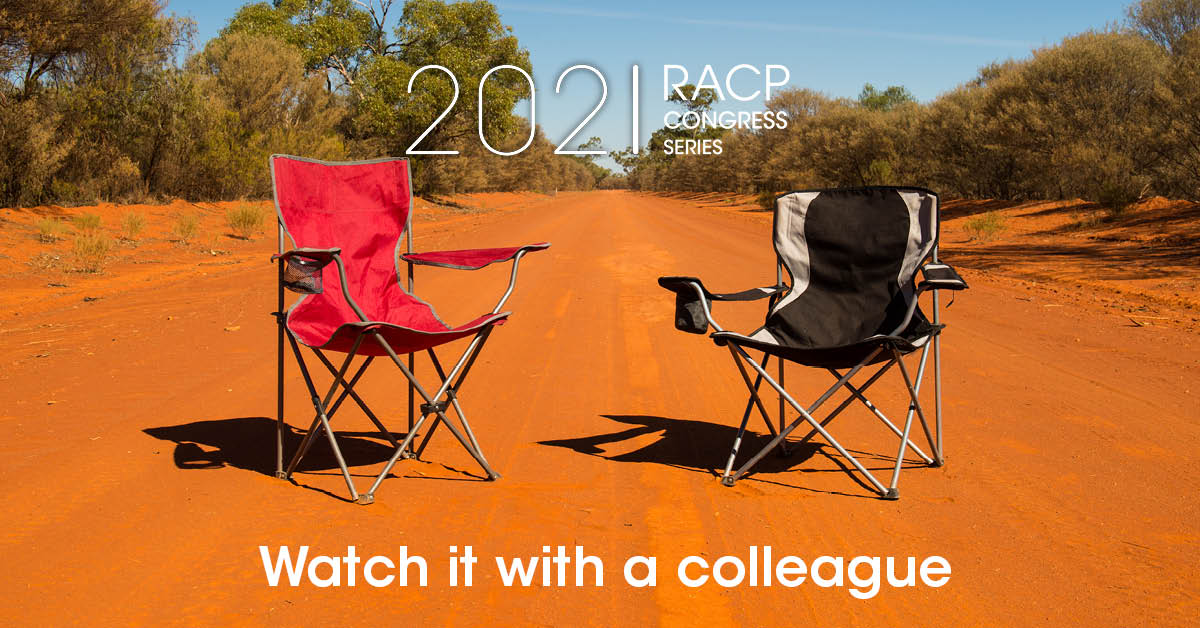The President's Message – 23 June 2021
Time and time again, College members ask for three things; value for money from their fees, transparency in College processes, and advocacy as a responsible organisation. The College works hard to advocate in our work with governments, at state and national levels on pressing issues identified by you.
As an organisation, we can speak with authority in a collective voice. Recently we’ve used this voice to help the Biloela family in Australia. They’ve struggled to receive the proper medical care for their daughter, Tharnicca. They’ve battled the treatment of asylum seekers and refugees by the Australian Government, and the response to the COVID-19 pandemic.
We released an open letter with eight other medical organisations asking the Australian Government to re-unite the family. We are pleased to see a positive resolution to the Biloela family’s situation, but we will continue to stand firm.
The ongoing physical and mental healthcare needs of refugees and asylum seekers are easy to ignore, but must be addressed by our governments. I urge you to read our position statement on refugees and asylum seekers.
During the pandemic, we have worked hard to ensure government responses are based on the best available medical information. We have also worked hard to ensure that when we have concerns or see failures, these concerns are addressed.
We continue to speak up regarding Australian COVID-19 preparedness, the safety of aged care workers, personal protective equipment, and the vaccination rollout.
We are also working hard to ensure that the progress we have made in telehealth is maintained as we move beyond the pandemic. We will continue to advocate to grow the number of public health physicians. They have played a crucial role in managing COVID-19.
The recent outbreaks in Melbourne and Sydney are a stark reminder that we still have a long way to go to get on top of this pandemic. You may find yourself growing frustrated with the disinformation and hesitancy from the public about vaccinations. Maybe you have strong opinions about how the vaccine rollout has been handled. Perhaps you simply feel frustrated and overwhelmed with the continuing pressures of providing care in this current environment.
Remember to take care of your own health and psychological wellbeing when engaging with your patients, and the community. There are many resources available to you. Never hesitate to ask for help. Take some time for yourself when you can, talk with your peers, or use the College support program, Converge. These resources are for you, and I encourage you to take advantage of them.
Finally, I want to acknowledge all of our Fellows who were recognised in the Queen’s Birthday Honours list in both Aotearoa New Zealand and Australia. You can read the full list of recipients in this bulletin. These honours highlight the continued efforts made by you across our greater community.
Professor John Wilson AM
RACP President
Congratulations to the 38 RACP Fellows recognised in the 2021 Queen's Birthday Honours lists.
These awards highlight the outstanding work RACP members do and the importance of that work in local, national and international communities.
Aotearoa New Zealand
Companion of the New Zealand Order of Merit
- Emeritus Professor David Richmond FRACP
For services to health and education.
- Robert (Simon) Rowley FRACP
For services to paediatric and neonatal care.
Australia
Officer (AO) in the General Division of the Order of Australia
- Professor Adrian Bauman FAFPHM
For distinguished service to public health, to the prevention of chronic disease, and to tertiary education.
- Emeritus Professor Colin Binns FAFPHM, FAFOEM
For distinguished service to medical research, to tertiary education, to public health policy and human nutrition.
- Dr Patrick (Toby) Coates FRACP
For distinguished service to renal medicine, to professional medical organisations, and to tertiary education.
- Professor Stephen Davis AM, FRACP
For distinguished service to medical education, to stroke research, and to the management of cerebrovascular disease.
- Professor Geoffrey Metz AM, FRACP
For distinguished service to medicine, to medical education both nationally and internationally, and to professional medical organisations.
- Dr Suzanne Packer AM, FRACP
For distinguished service to children through roles in health, welfare and protection initiatives.
- Clinical Professor Carol Pollock FRACP
For distinguished service to medical research, education and science, to nephrology, and to clinical practice and governance.
Member (AM) in the General Division of the Order of Australia
- Dr John Andrews FRACP
For significant service to nuclear medicine, and to professional societies.
- Professor Philip Aylward FRACP
For significant service to medicine, and to community health administration.
- Dr Gavin Becker FRACP
For significant service to medicine, to nephrology, and to professional societies.
- Clinical Professor Flavia Cicuttini FRACP, FAFPHM
For significant service to medicine, and to musculoskeletal disease research.
- Dr David Durrheim FAFPHM
For significant service to public health medicine, and to international health.
- The Reverend Dr Cecilie Lander FRACP
For significant service to neurological medicine, and to the Anglican Church of Australia.
- Professor Frank Mastaglia FRACP
For significant service to neuromuscular disease, and to professional associations.
- Emeritus Professor Ian Riley FAFPHM
For significant service to tertiary medical education, notably to tropical health.
- Clinical Associate Professor Gary Sholler FRACP
For significant service to paediatric medicine, and to tertiary medical education.
- Dr Charles Steadman FRACP
For significant service to tertiary medical education, and to gastroenterology.
- Professor Helena Teede FRACP
For significant service to medical education and research, to endocrinology, and to women’s health.
- Associate Professor Edwina Wright FRACP
For significant service to medicine and research, notably for people living with HIV/AIDS.
Medal (OAM) of the Order of Australia in the General Division
- Professor Frank Alford FRACP
For service to endocrinology.
- Associate Professor Kevin Alford FRACP
Port Macquarie NSW 2444 For service to medicine as a cardiologist.
- Clinical Professor Eugene Athan FRACP
For service to infectious diseases medicine.
- Dr Geoffrey Byrne FRACP
For service to paediatric endocrinology.
- Associate Professor Stephen Della-Fiorentina FRACP
For service to oncology.
- Clinical Professor Peter Gates FRACP
For service to neurology.
- Dr David Hare FRACP
For service to cardiology.
- Dr David Hooke FRACP
For service to nephrology, and to aviation medicine.
- Dr Alexander Levendel FRACP
For service to cardiology and nuclear medicine.
- Dr Mark Pitney FRACP
For service to cardiology.
- Associate Professor Hyam (Barry) Rawicki FAFRM
For service to medicine as a rehabilitation specialist.
- Dr Laurence (Larry) Roddick FRACP
For service to paediatric medicine.
- Dr Richard Willing FRACP
For service to conservation and the environment.
- Dr Karen Zwi FRACP
For service to paediatric medicine.
Public Service Medal (PSM)
- Dr Michelle Cretikos FAFPHM
For outstanding public service to community health in New South Wales.
- Dr Jeremy McAnulty FAFPHM
For outstanding public service to infectious diseases monitoring and environmental health in New South Wales.
- Professor Nicola Spurrier FAFPHM, FRACP
For outstanding public service to community health in South Australia.
The RACP is calling on the Australian Federal Government to urgently release the Biloela family from detention and says Australia’s detention of refugees and asylum seekers continues to fly in the face of medical advice.
Professor Catherine Choong, President of the RACP’s Paediatric and Child Health Division, says “In the immediate term, we’re urging the Australian Government to provide the Biloela family with all the medical care they need, as well as any other refugees or asylum seekers in need of medical attention.”
Read media release
The RACP’s position statement on Refugees and Asylum Seeker Health supported by 14 peak medical organisations can be found on the RACP website.
We are happy to report that The Australasian Faculty of Rehabilitation Medicine (AFRM) Module 1 Assessment was successfully delivered by Computer-Based Testing (CBT) on 18 May 2021 at 11 sites across Australia and Aotearoa New Zealand. Seventy-four candidates sat the exam and senior RACP staff were in attendance at all venues.
We are currently undertaking a detailed evaluation, which will include feedback from candidates and will inform the implementation of the Divisional Written Examination in October 2021 delivery by CBT.
Thank you to everyone who participated in the 2020 consultation on the proposed common learning, teaching and assessment (LTA) programs for Advanced Training (AT). Your feedback was used to refine the programs and ensure they are robust and appropriate.
The common LTA programs for Advanced Training have now been finalised.
The common LTA programs will establish a baseline for learning, teaching and assessment across all AT programs. As each specialty undertakes their program-specific curricula reviews, they will build on the common LTA programs to meet the needs of their specialty.
This year, in collaboration with the Curriculum Advisory Group, we will continue to support the first six specialty groups to undertake the development process:
- cardiology (Adult Medicine)
- cardiology (Paediatrics & Child Health)
- gastroenterology
- geriatric medicine
- nephrology
- general rehabilitation medicine.
Find out more
The RACP regional teams have again donned their #crazysocks4docs this year in support of the mental health initiative by RACP member Dr Geoff Toogood. Geoff is a consultant cardiologist in Melbourne and the founder of the CrazySocks4Docs movement. Join us in support of #crazysocks4docs to break down the stigma around mental health issues in doctors and health professionals. Find out more about this important initiative at the CrazySocks4Docs website and visit the RACP website for wellbeing resources including details of the RACP support program.

A feature of the Federal Budget 2021-22 was its response to the 148 recommendations from the Royal Commission into Aged Care Quality and Safety (the Commission). The Budget reflected the Government’s acceptance or acceptance-in-principle of 126 of the Commission’s recommendations and its rejection of six. The remaining recommendations are either under consideration or have been supported in other ways.
College members made strong contributions to the Commission through the College’s 2019 submission and the later 2020 submission impact of COVID-19 on aged care.
Of our 56 recommendations in 2019 submission, only five were not addressed by the Commission, and five were taken up in less direct ways. With the Government’s positive response to the Commission’s recommendations, we anticipate seeing the majority of our recommendations implemented either directly or less directly, which we will monitor.
Some examples of where the Federal Budget has responded to Royal Commission recommendations, consistent with the College’s recommendations, include:
- improved assessment provisions such as the single assessment process
- more home care packages
- improved access to specialists and other health practitioners through multidisciplinary outreach services
- support to increase the cultural competency of service provider staff, and to address some of the barriers Aboriginal and Torres Strait Islander older people experience in relation to aged care services
- funding for Primary Health Networks to provide end-user support for the use of telehealth in residential aged care facilities.
Over the next four years of the Budget’s provisions for aged care, the College will continue to advocate for improvements in aged care services as recommended by our contributing College members.

The hybrid experience of RACP Congress 2021 was a great success in proving the viability of the combination of an in-person and live streaming event. Bringing together an extensive program from across the Divisions and Faculties along with clinical updates created an experience that was extremely engaging and accessible.
With the assistance of our technology partner, Microsoft, the entire recorded program featuring over 80 sessions is now available online until Friday, 29 October 2021.
For those of you who were unable to attend RACP Congress 2021 and wish to view the content, you are still able to purchase a virtual ticket until Friday, 25 June 2021 and receive access to all the recorded material.
Get access now

Neil Hamilton Fairley Medal
The Neil Hamilton Fairley Medal is awarded by the RACP every five years in recognition of an individual who has made outstanding contributions to the field of medicine. Nominations for the 2022 award are now being accepted.
The award is open to both RACP Fellows as well as non-members of the College. However, the nominee must be nominated by a RACP Fellow to be considered. Details on the application process and selection criteria is available on the Foundation webpage. Nominations close on Tuesday, 31 August 2021.
Find out more
College Medals and Awards
Nominations are now open for these prestigious College Awards acknowledging outstanding contributions and achievements made by our Fellows and trainees in their respective fields:
If you know a colleague or mentor who you think should be recognised, now is the time to nominate. Nominations close Tuesday, 14 September 2021, so submit your nomination today. Full details are available on the RACP Foundation webpage, or email us for enquiries.
Find out more
The RACP Foundation Research Awards
Applications for the 2022 RACP Foundation Research Awards are now open. Upwards of 50 awards up to a total value of $2.5M are available to support Fellows and trainees at different stages of their research careers. Please refer to the RACP Foundation webpage for information on specific eligibility requirements for each award, or click on the below links for further details:
Find out more
RACP Online Learning
You're invited to join Dr Robert Lethbridge as he hosts this virtual live screening of The Advocate’s Journey mini-documentary series. The online event will be held Thursday, 24 June from 6pm to 8pm AEST, 8pm to 10PM NZST.
The series of five short episodes features engaging interviews features interviews of well-known physicians who have taken the leap into advocacy and achieved remarkable outcomes from their work. Interviewees include Dr Helen Young, Professor Fiona Stanley, Dr Graeme Edwards and other respected advocates and experts. Throughout the screening you’ll gain valuable insights into becoming a physician advocate, engaging key stakeholders, getting issues on the public agenda, and the results of advocacy.
Register now
A new paediatric upskilling section has just been added to the popular Clinical Genomics for Physicians online course. The course introduces Australasian medical specialists to genomics, and the new paediatrics section assists paediatricians and other physicians with ordering genomic tests under MBS item numbers 72258 - 73361, introduced in May 2020. The course is self-paced and adaptable, designed so you can just complete the parts that are relevant to you, when it suits you.

We’re hosting more online events than ever before, so have introduced a condensed monthly events digest. The June digest was emailed to you, but you can also read it online.
This monthly communication will be sent to you on the first Wednesday of each month, to provide you with an opportunity to virtually attend events from all over Australia and Aotearoa New Zealand. We hope this makes your life that little bit easier and we look forward to seeing you at our next event.
Discover upcoming events
Your perspective
We invite all members to respond to this survey and value your feedback. Your perspective is crucial to better understanding the type of work undertaken, the distribution of the workforce, identification of unmet health needs and perceptions of medical specialists who treat people with intellectual disability.
The survey will only take five to 10 minutes to complete. Your participation provides a clearer picture of how we can better educate, advocate, and innovate in the intellectual disability health sector. In addition, it may assist the current Australian Royal Commission into Violence, Abuse, Neglect and Exploitation of People with Disability.
Complete the survey
RACP acknowledges the emergence of digital health as an important component of modern healthcare delivery. In response, a new Digital Health Advisory Group reporting to the Continuing Professional Development (CPD) Committee has recently been established. The group will work on establishing a continuing professional development program of educational initiatives on digital health for RACP members.
The members of the new Digital Health Advisory Group are:
- Associate Professor Clair Sullivan, FRACP– Chair
- Professor Ian Scott, FRACP
- Dr Michael Herd, FRACP
- Dr Philip Coote, FRACP
- Dr Sandra Johnson, FRACP
- Dr Tai-Tak Wan, FAFRM
- Dr Craig Coorey, RACP trainee
- Dr Gabriel Paykin, RACP trainee
- Mrs Debra Letica, consumer representative
- Associate Professor Brian Chapman, subject matter expert
- Dr Christine Slade, subject matter expert
- Dr Daniel Capurro, subject matter expert
- Ms Kristy Jackman, subject matter expert
- Professor Tim Shaw, subject matter expert.
We are excited to progress work in this area with such a passionate and experienced group. We are also very grateful for the valuable contributions of Associate Professor Clair Sullivan who will be leading the group.
In March 2021, the RACP endorsed the final version of this standard from the Australian Commission on Safety and Quality in Health Care (ACSQHC) to improve the care of patients who receive a peripheral intravenous catheter (PIVC) in a hospital or healthcare setting. The Standard was officially launched on 26 May 2021.
The Management of Peripheral Intravenous Catheters Clinical Care Standard outlines how to insert, maintain and remove PIVCs safely and effectively. It is a common procedure for almost everyone who goes to hospital, yet almost 70 per cent need to be removed due to complications, including blockages, infections and other problems. The standard will help to improve the techniques used by healthcare professionals and reduce the risk for patients who may experience issues with insertion or complications afterwards.
The new clinical care standard and resources are available from the ACSQHC website.
The Australian Government Department of Health (the Department) has updated its Medicare billing in public hospitals webpage in response to feedback received from peak bodies including the College. The webpage contains guidance material to strengthen provider education on appropriate Medicare billing in public hospitals. This includes case studies to clarify appropriate referrals following episodes of hospital care, and the hospital’s responsibility to undertake any testing required for public patients. The feedback has also informed a new set of FAQs, which provide additional clarity on key points raised in the case studies.
The Department thanks peak bodies and clinicians involved in the revision process. If you have further comments or feedback, please contact the department at hospital.compliance@health.gov.au.
We are excited to announce that the first Paediatrics and Child Health annual lecture schedule for the College Learning Series (CLS) will be published on 30 June.
The learning series is a comprehensive online library of lectures mapped to the new Basic Training Curriculum which will continue to roll out from 2 July 2021 to 31 January 2022. The CLS has been designed to help complement experiential learning and is adherent to the Basic Training Curriculum. The lectures are peer-reviewed, voluntarily prepared and recorded by paediatricians from across Australia and Aotearoa New Zealand.
“We are thankful to the Paediatricians who have offered their valuable time in helping develop this high-value resource base for our trainees,” says Dr Rani Bhatia, Chair of the College Learning Series Committee (Paediatrics & Child Health Division). “We hope that at least 80 lectures will be uploaded in the roll out period and this schedule of lectures will further build on educational lectures provided by locally administered programs".
The CLS is also seeking Fellows and Advanced Trainees who are interested in reviewing new lectures before they go live. To find out more, contact the CLS team at CLS@racp.edu.au
CLS is part of the Educational Video Libraries found at the College’s Online Learning Resources.
The early view of the June 2021 Journal of Paediatrics and Child Health is now available.
Key highlights include:
-
Lessons learnt during the COVID-19 pandemic: Why Australian schools should be prioritised to stay open
-
Retrieval of neonatal and paediatric patients on extracorporeal membrane oxygenation support in New South Wales
-
Effect of WeChat follow-up education on breastfeeding efficiency of infants after congenital cardiac surgery and parents' satisfaction: A short-term follow-up study
-
Incidence, severity and clinical manifestations of juvenile dermatomyositis among Māori and Pacific Islanders compared to European children
-
COVID-19 public health measures and respiratory viruses in children in Melbourne
-
Progression from sepsis to septic shock and time to treatments in preterm infants with late-onset sepsis.
Read now
The June 2021 issue of The Internal Medicine Journal is now live on the Wiley Online Library. This month’s Editor's Choice is an original article titled Lung, breast, and bowel cancer treatment for Aboriginal people in New South Wales: a population-based cohort study.
Key highlights from the issue are:
- Energy drinks: physiological and pathological effects
- COVID-19 and future pandemics: is isolation and social distancing the new norm?
- Inpatient use of oxygen therapy in acute respiratory disease
- Cirrhosis: changing prevalence of aetiological factors and comorbidities
- Role of antithrombin III in idiopathic pulmonary fibrosis patients treated with nintedanib
- Medication use and cognitive impairment
Read now
Researchers at Bond University want to hear about your experience completing your specialty requirements for Advanced Training via this short survey.
You are eligible to take part if you:
- are currently undertaking your specialty training at an Australian or Aotearoa New Zealand specialist training college
- have completed your specialty training at an Australian or Aotearoa New Zealand specialist training college in the past five years.
Participation in this survey is voluntary and should only take 10 minutes.
This survey has ethics approval from the Bond University Human Research Ethics Committee [HREC: PS00149].
Now available to both Australian and Aotearoa New Zealand Fellows, Member Advantage has partnered with Tesla to offer you access to the Tesla Corporate program. Enjoy exclusive benefits on Tesla vehicles and energy products including a complimentary three-year maintenance plan, waived delivery fee and $500 off solar and Powerwall installation^.
Simply complete the enquiry form on your benefits platform and a dedicated Tesla Member Advantage consultant will be in touch.
Find out more on the Member Advantage Australia website and Aotearoa New Zealand website.
^Benefits only apply to new purchases and cannot be added retroactively to existing orders. Terms and conditions apply.

Stay informed
Read other RACP eBulletins: